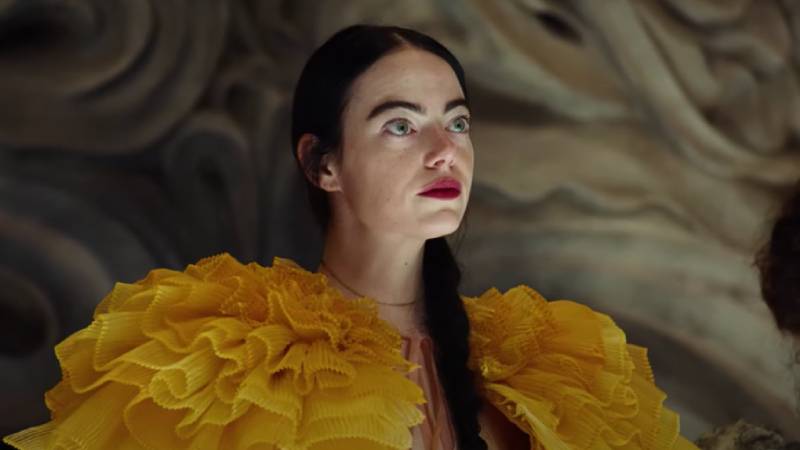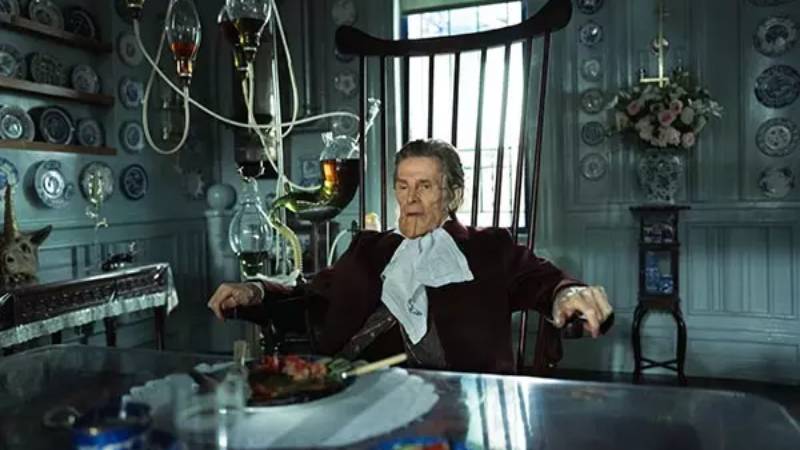From a stereotypical point-of-view, no one would expect that there are films on Disney Plus like Poor Things (Yorgos Lanthimos, 2023). Even I was very surprised that this thought-provoking adaptation of Alasdair Gray’s novel was available on the platform. But then again, I found myself watching the entire movie. Did I like it? Still dwelling on what I felt to be honest. Here’s the thing though, I wasn’t able to read the novel, so I won’t be able to compare the story or if the movie did justice to the original story.
But on its own, the movie was kind of hard to watch at first, especially if you’re not comfortable watching in black and white. Story-wise, it’s where it gets interesting. So, let’s break down the entire movie and I’ll share with you everything that I loved and some things that felt meh for me. Right now, you can watch this award-winning movie on various streaming platforms, including Disney+, Hulu, Amazon Prime Video, Apple TV+, Dish TV, and more!
…
.
The cast
I’d be lying if I say that I didn’t watch the movie because of the cast. I saw Emma Stone on the movie cover, and that’s when I knew I had to watch this film. Apart from the story itself, it’s safe to say that the combined talents of the cast is what completed this movie. Let me introduce you to the major cast one by one.
.
1 – Emma Stone as Bella Baxter:
Bella Baxter (pictured below) is a young woman brought back to life through an unorthodox scientific experiment by Dr. Godwin Baxter. Throughout the movie, Stone portrayed the character beautifully. She was weird, vulnerable, and full of curiosity all at once.
2 – Willem Dafoe as Godwin Baxter:
Willem Dafoe is perfectly cast as the eccentric Dr. Baxter (pictured above). He brings his signature intensity to his character – the type that leaves you never quite sure what Dr. Baxter’s motivations are. Is he a bad guy or is he one of the good ones? He’ll definitely keep you guessing throughout the movie.
3 – Mark Rufallo as Duncan Wedderburn
Duncan Wedderburn is the villain of the story – a corrupt lawyer who uses his fancy talk and exciting plans to win Bella over. He’s all about himself and wants to control everything around him. It’s hard to tell if he actually likes Bella or just sees her as something he can own.
4 – Ramy Youssef as Max McCandles
Ramy Youssef plays the sweet and gentle Max. He’s the complete of Duncan. He’s a kind soul, a bit awkward maybe, but genuine and caring. Aside from Godwin, Max is probably the only one who genuinely cares for Bella. And despite witnessing Bella develop, he accepts him with his whole heart.

.
The story
Before we proceed, keep in mind that there will be spoilers at the end of this article. And if you’re planning to watch the movie, make sure to have a fast and stable connection like the one from HughesNet so you can really enjoy and understand the story. Back to the story… The movie starts in black and white following different scenes, like a glimpse of Godwin and Bella’s everyday lives together. Godwin’s face is full of scars, like the entire skin of his face has been detached and re-attached in several parts, while Bella looks like a typical adult woman who’s wearing an elegant dress.
Dr. Godwin Baxter is an extraordinary surgeon renowned for his operating skills. While Bella seems like a typical adult woman suffering from a mental disorder, it’s not the case. Bella is Dr. Baxter’s experiment. She is brought back to life by Dr. Baxter after jumping off a bridge – she’s pregnant by the way. Since she’s technically dead and her brain isn’t working, Dr. Baxter used her baby’s brain (from her womb) and placed it in her skull. So now, we have a young woman’s body with the mind of a newborn. This explains how Bella acts.
With a newborn’s mind, Bella was full of curiosity until she discovered a sensation that sparked a different kind of curiosity. That’s also the way Duncan made his way into her life and invited her to elope with him. The time they spent together is where Bella actually grew. She was exposed to the real world, wherein she learned everything about human nature, the societal norms, and everything in between.
As a viewer, you will see Bella’s world and how the people around her sees a typical woman. An object, a possession, a should-be-mother, and whatnot – just like how some individuals think of one up until this day. However, Bella was a free woman. She’s independent, determined, and everything the society isn’t expecting her to be. There are scenes that can be disturbing and unsettling to watch, think of a horror scene you can see on Spanish TV, but with Bella, it’s a different kind of horror.
It’s the horror of watching someone break the societal mold. Bella’s innocence and untamed desires challenge the very core of what society deems proper for a woman. It’s how we see how women will be treated if we disregard the societal norms that’s already in place, how men sees themselves superior than women, how the society criticizes every decision a woman make for her body and her life, yet it wouldn’t be the same if it was men on Bella’s place.

.
The business of pleasure
After leaving Duncan, Bella decided to sell her body for money. While this type of work is stereotyped and constantly criticised by the society, it shamelessly show how the criticism often comes from those who pay for this type of work. For every transaction, Bella analyses her so-called clients, and it goes to show that individuals into this type of work comes from different backgrounds – family men, politicians, and even church people. It’s the harsh truth surrounding this industry for so many years.
…
.
The final verdict
This is a beautiful yet disturbing story about a woman’s story of self-discovery in a way that’s both liberating and unsettling. Emma Stone’s acting was brilliant, and it will really keep you thinking about the prejudices in our society about women. This movie definitely deserved the Oscars wins, and if you haven’t watched it, then go ahead and do it right now. It’s definitely worth every second.








